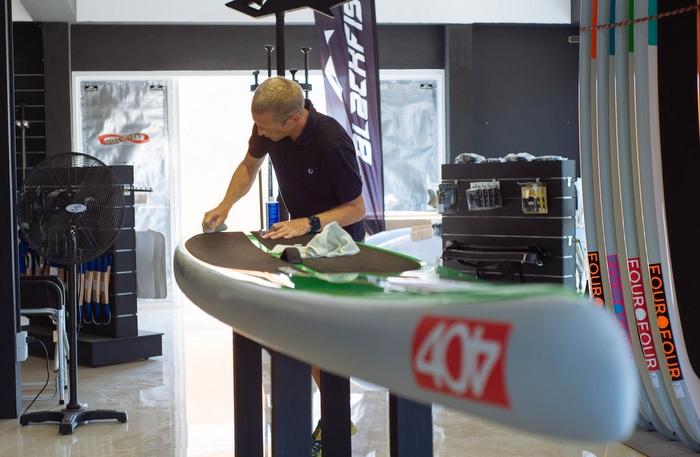Staying afloat in a niche market

PHUKET: Business that are called ‘labors of love’ are referred to this way because the profit margins, if any, don’t justify the investment. Nonetheless, these business – often small retailers – are the building blocks of unique communities. So is the case with Longtail Paddlesurf Co Ltd.
Though the sport of standup paddleboarding (SUP) is still in its infancy in the region, it has boomed in North America. So despite delayed growth, there is clear potential.
“Almost every body of water in North America will have paddlers during the summer. Here, I see less than five per week. This summer I spent a few weeks racing in Canada and the United States and I was amazed at the numbers. Vancouver, for example, has a Tuesday night race series with 75-100 paddlers of all kinds on the starting line. The sport is huge!” David Smart of Longtail Paddlesurf explained to the Gazette last week.
“So, we will continue to work with others in the local industry to build on what we have.”
“In early March, we will host the 4th Annual Phuket Paddle Festival down at Bliss Beach Club. Tim and the guys at StandUp Projects have done a great job of running the event and this year we are going to make it even more fun and inclusive. The week prior to the race, we will be hosting a paddle clinic run by a top level professional paddler from the United States.”
The sport itself is exceptionally diverse and well suited to the multifaceted fitness and health market segment booming on the island. Though most think of SUP as a race sport, it is also used for surfing.
This year saw SUP athletes take on a number of enormous waves throughout the world. SUP is also useful for yoga and family outings… bring the dog if you like.
Though the health benefits of SUP are well documented, it remains a niche market, even within the water sport market segment. So, the key for a retailer to stay afloat is increasing brand awareness.
“Today, life as an independent retailer is tough, so I think the short answer [to how to market the business] is to be true to yourself and focus on what you are best at. We are a shop that is truly passionate about the sport – I paddle almost every day. This gives us great insight into local places to paddle and what equipment works in our market. Building our brand is achieved by a consistent effort to promote the sport and the amazing paddling environment that we call home,” Mr Smart explained.
Mr Smart has seen two major changes in the SUP market within the last five years.
“For us, the two biggest changes have been around design and production costs. The first SUP board shapes either looked like large surfboards or gone-wrong kayaks and they were extremely heavy.
Today, shapers are almost a thing of the past – except with custom boards. Most boards are being designed using CAD and flow dynamic software and the result is a significant improvement in performance in terms of speed and stability,” he explained.
The other major change is production costs.
“Today, it is reasonably easy to find a factory in China to build you some SUP boards. This has meant that the price of an entry level board is very low. In the US you can by a board at Walmart or COSTCO for less than US$350 [12,500 baht]. But sadly this board is an environmental disaster, paddles poorly and won’t last.”
“So for us, this has meant that we focus on a quality product that is going to exceed our customers’ expectations. By carrying four to six different brands we are able to provide our customers with a range of options and price points. Given that our product is good quality, it means that we now have slightly lower inventory levels and we focus on brands that are like minded – support the growth of the sport and believe in building a quality product.”
Thailand is the largest producer of SUP boards in the world, which would, at first, seem to be a competitive advantage for Longtail Paddlesurf. Additionally, the Bangkok-based company Cobra is a world leader in composite fabrication, allowing for Starboard, SIC, Fanatic and others top brands to be built in the Kingdom.
“Despite the boards being built here in Thailand, we still have to pay high levels of tax. If we import boards from Vietnam, China or the US, the import duty is… well let’s just call it variable. This makes having consistent pricing very challenging, not to mention the headaches of logistics,” Mr Smart explained.
Though there are challenges, the five-year-old company, which has been paddled forward for the last two years by Mr Smart, is churning a profit.
“The shop is profitable, but it is more a labor of love than a logical investment vehicle. If you look at the inventory we carry and the return on investment, it is not ideal. What makes it worthwhile is when we take visitors for a paddle or we are teaching kids to paddle and we see the smiles on their faces and how stoked they get. That makes it all worthwhile,” Mr Smart added.
— Isaac Stone Simonelli
Latest Thailand News
Follow The Thaiger on Google News:


























